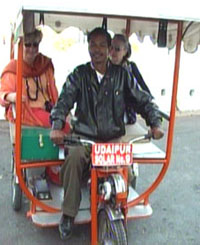 |
|
|
Jan 2005 Solar rickshaws come to Udaipur's aid
Udaipur: A voluntary group in Udaipur has brought in solar-powered rickshaws to ferry tourists in an attempt to save them from vehicular fumes. The vehicles have come as a breather for the congested city made worse by the dozens of auto-rickshaws and taxis, many of them more than two decades old, spewing fumes through its serpentine streets. Designed by a British environmentalist, the solar ferries are electric cars with solar batteries. As the drivers wait for their passengers to return from tours, the solar panels keep on charging the batteries, which can store power for more than 12 hours of plying time, which means the vehicles can even run at night. The solar cycle-rickshaw can also be pedalled like a normal one. Ashok Singh Shekhawat, one of the few dozen auto drivers chosen in the pilot project, was more than satisfied with the performance of his fragile-looking vehicle, which is sturdy, spacious and well suited for the desert city. "The average is around 60 km per hour. It is driven throughout the day as sunlight charges the battery. The response is very good. The tourists appreciate it. The most important thing is that there is no pollution," Shekhawat said. Despite the encouraging response, getting the solar rickshaws into the mainstream is a difficult task. At over 1,000 dollars per unit, they are twice the cost of a regular diesel-powered auto and the solar panels need good maintenance, which many of the already poor drivers would not be willing to spend on. The
Maharana Charitable Trust, spearheading the project, however, says most
locals can be convinced of its long-term price efficiency. The group
has already been successful with its solar-powered boat, used extensively
by rich hotels and resorts, and is hopeful they will strike it big with
the lower-end rickshaws as well. "Our aim is to make Udaipur a solar
city. The bikes and everything else should be run on solar energy. We
are doing more research on this. Our solar boats are a 100 per cent
success," said Anu Vikram, manager of the trust. Rajasthan's second
most favoured tourist destination, Udaipur along with Jaipur and Jaisalmer
accounts for one-fourth of the total international tourist arrivals
in India. But despite its prominence on the country's tourist map, the
city in recent years has faced much flak for poor maintenance of its
deteriorating architectural wonders and lakes. |
NOTE: Free contributions of articles and reports may be sent to editor@indiatraveltimes.com
DISCLAIMER
All Rights Reserved ©indiatraveltimes.com
